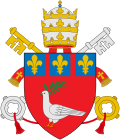| Cum occasione Apostolic constitution of Pope Innocent X | |
|---|---|
 | |
| Signature date | 31 maggio 1653 |
| Subject | Condemned five propositions found in Cornelius Jansen's Augustinus as heretical |
Cum occasione is an apostolic constitution in the form of a papal bull promulgated by Pope Innocent X in 1653 which condemned five propositions said to have been found in Cornelius Jansen's Augustinus as heretical. [1]
Contents
The five errors of Jansen on Grace condemned in Cum occasione are:
- "Some of God's commandments are impossible to just men who wish and strive to keep them, considering the powers they actually have; the grace by which these precepts may become possible is also wanting to them." [2] [a]
- "In the state of fallen nature no one ever resists interior grace." [2] [3]
- "In order to merit or demerit, in the state of fallen nature, we must be free from all external constraint, but not from interior necessity." [4] [b]
- "The Semi-Pelagians admitted the necessity of interior preventing grace for all acts, [c] even for the beginning of faith; but they fell into heresy in pretending that this grace is such that man may either follow or resist it." [4] [d]
- "It is Semi-Pelagian to say that Christ died or shed His blood for all men." [4] [e]
Bernard Otten explained, in A manual of the history of dogmas, that the first four of these propositions are absolutely condemned as heretical; while the fifth is condemned as heretical when taken in the sense that Christ died only for the predestined. [4]